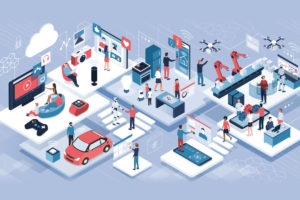A technological revolution is underway and it is happening in your lifetime. These are exciting times in the world of tech. Innovative ideas and concepts are currently being explored and developed which will soon change our everyday lives as we know it. Many of these innovative technologies are very much worthy of their own post, but today I will just briefly highlight three of them. I do this to get young people thinking. Hopefully this post will inspire a young person to think about their future, the jobs of the future, and the types of industries that may be created because of these emerging technologies. In addition, I feel that today’s topics highlight the importance of STEM studies. The more you know about the emerging technologies listed below, then the better you will be prepared for the careers of tomorrow and the industries of the future.
IoT (Internet of Things)
 So lets start with IoT (Internet of Things). Basically the Internet of Things means that the computers in everything around us are enabling the interconnection of devices, appliances, and various other technologies to share data over the Internet. I think most people get the gist of this one. IoT is not a hard thing to imagine. If you’ve seen Google Home, Amazon Echo, or similar devices then this is nothing new to you. These devices can communicate with other smart devices in your home and regulate room temperature, turn on and off appliances, find local businesses specific to your needs, setup routines, give you reminders, and notify you when your favorite show is coming on television. That is the short version of a long list of features that is continuously growing. Now, imagine a smart refrigerator notifying a smart home device to order more milk because a person is running low, or a Tesla not only reminding someone that they need a new cabin air filter but actually ordering one for them. Is this far fetched?, Not really.
So lets start with IoT (Internet of Things). Basically the Internet of Things means that the computers in everything around us are enabling the interconnection of devices, appliances, and various other technologies to share data over the Internet. I think most people get the gist of this one. IoT is not a hard thing to imagine. If you’ve seen Google Home, Amazon Echo, or similar devices then this is nothing new to you. These devices can communicate with other smart devices in your home and regulate room temperature, turn on and off appliances, find local businesses specific to your needs, setup routines, give you reminders, and notify you when your favorite show is coming on television. That is the short version of a long list of features that is continuously growing. Now, imagine a smart refrigerator notifying a smart home device to order more milk because a person is running low, or a Tesla not only reminding someone that they need a new cabin air filter but actually ordering one for them. Is this far fetched?, Not really.
 The point is that the IoT is here to stay, and the devices around us will eventually become more connected in the near future. According to an article from iotglobalnetwork.com, the global IoT market is set to grow to $1.5trn annual revenue by 2030. Here are some additional statistics regarding the growth of IoT from Statista.
The point is that the IoT is here to stay, and the devices around us will eventually become more connected in the near future. According to an article from iotglobalnetwork.com, the global IoT market is set to grow to $1.5trn annual revenue by 2030. Here are some additional statistics regarding the growth of IoT from Statista.
Listed below are a few possible career options to consider if IoT is of interest to you.
- Network Engineer
- IoT Architect
- Software Engineer
- Firmware Engineer
- Hardware Engineer
- IoT Data Analyst
- IoT Data Scientist
- IoT Application Engineer
- IoT Developer
- IoT UX Designer
Computer Nanotechnology
Nanotechnology is the next topic on our list. Nanotechnology is the study and application of extremely small things. It’s implementation is used in several different scientific fields. Applications of nanotechnology can be found in chemistry, biology, physics, materials science, and engineering. In terms of computer engineering, lets imagine a common circuit that is moving an electrical current. Now, lets scale that circuit down and imagine it as a single transistor with the purpose of moving a single electron in order to provide a signal to a system. Can you imagine how small something like that would be? We can not dive too deep into the science behind these topics on this particular post because it would be far too lengthy, but lets see a what that type of technology may look like in the future.
Just earlier this year Samsung released it’s Galaxy Z.  The Galaxy Z is now the flag ship of Samsung’s foldable technology. This technology is made possible by our continued advances in computer nanoscience. This type of technology will improve over time and may possibly change the overall look and feel of our cell phones and other devices moving forward.
The Galaxy Z is now the flag ship of Samsung’s foldable technology. This technology is made possible by our continued advances in computer nanoscience. This type of technology will improve over time and may possibly change the overall look and feel of our cell phones and other devices moving forward.
If you are curious as to what role nanotechnology may have in our future, then I encourage you to checkout nano.gov. There you will find plenty of information, such as the following writeup titled, “A Federal Vision for Future Computing: A Nanotechnology-Inspired Grand Challenge”. It outlines a collaborative effort between the Department of Energy (DOE), the National Science Foundation (NSF), the Department of Defense (DOD), the National Institute of Standards and Technology (NIST), and the Intelligence Community (IC). There is a great deal of research and development currently going on in this field, and a few interesting career opportunities may arise in the near future. If you are interested in computer nanotechnology, listed below are a few careers that you may want to consider.
- Nanotechnology Research Scientist
- Nanotechnology Material Scientist
- Nanotechnology Chemist
- Nanotechnology Formulation Scientist
- Nanofabrication Engineer
Quantum Computing
 Have you heard about Quantum Computing? Well, companies all over the world are now applying the principles of quantum mechanics to computers in order to build the machines of tomorrow. Our typical computers move units of information called bits. You’ve probably heard of them, and you may have even seen binary number representations of them. Bit’s are usually denoted by a ‘1’ or a ‘0’. We can also think of this as a basic true or false. Is something ‘on’, or is it ‘off’? Quantum computers deal with Qubits. A qubit uses our current knowledge of quantum mechanics in order to introduce superposition and entanglement to preform computations. Science tells us that a qubit can exist in multiple states at the same time, until it is measured. It can also hold up to two bits worth of data. That may all seem strange if this is something that you are hearing about and/or reading about for the first time. Don’t worry we may revisit this specific topic in another post.
Have you heard about Quantum Computing? Well, companies all over the world are now applying the principles of quantum mechanics to computers in order to build the machines of tomorrow. Our typical computers move units of information called bits. You’ve probably heard of them, and you may have even seen binary number representations of them. Bit’s are usually denoted by a ‘1’ or a ‘0’. We can also think of this as a basic true or false. Is something ‘on’, or is it ‘off’? Quantum computers deal with Qubits. A qubit uses our current knowledge of quantum mechanics in order to introduce superposition and entanglement to preform computations. Science tells us that a qubit can exist in multiple states at the same time, until it is measured. It can also hold up to two bits worth of data. That may all seem strange if this is something that you are hearing about and/or reading about for the first time. Don’t worry we may revisit this specific topic in another post.
One of the main things to remember is that quantum computers have the potential to drastically change the overall landscape of data security around the world. We are looking at a double edge sword here. They will have the potential to drastically beef up encryption security, or tear it down faster than anything we have ever seen before. Billion dollar companies and governments are racing one another in order to gain quantum supremacy. This is because quantum computers will not only bring great benefits but they also bring forth some challenges and potential threats to those who lag behind. They have the potential to make it a lot easier for users to access encrypted data. On the other hand, they may also serve to protect encrypted data by creating a virtually unhackable system. This alone is HUGE in terms of national security for any nation. This is a true race, and nations all over the world are placing a lot of resources into quantum computing research and development. There is likely to be a booming industry for quantum computing in the future. Here is an interesting article in CNET titled, “US begins $1 billion quantum computing plan to get ahead of ‘adversaries’”.
So what are the some possible career opportunities to consider if this interests you?
- Quantum Computing Research and Development Scientist
- Quantum Control Engineer
- Quantum Software Engineer
- Quantum Hardware Development Engineer
- Quantum Design Engineer
- Experimental Physicist
- Quantum Technician
Conclusion
There are a lot of innovation ideas currently being explored. The innovation that is being explored today may lead the way in tomorrow’s technological revolution. The three emerging technologies that we’ve addressed in the post above will likely lead to new inventions, new business models, and completely change companies and industries. Although this site stresses the importance of a STEM education, please know that these technologies are not exclusive to any one person. It will be possible for anyone to work in these industries, or with these technologies, and contribute to the science community in some capacity without a STEM degree. The important thing is that you are aware of these emerging technologies and realize that they will likely play a small role your future, whether it is two years from now or ten years from now. The more you know about these emerging technologies then the better you will be prepared for the careers of tomorrow and the industries of the future.
If you would like to subscribe to the STEMVoodoo.com mailing list, please enter your first name and email below.
[mailpoet_form id=”2″]